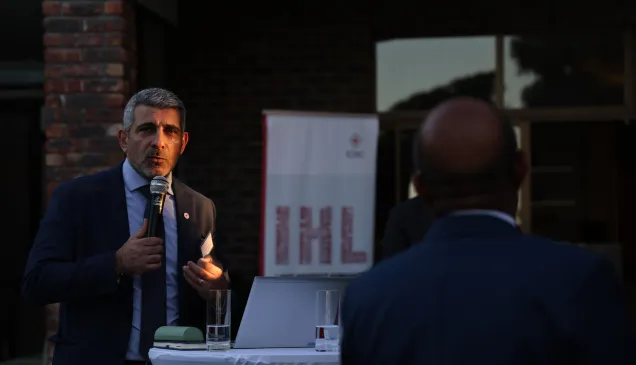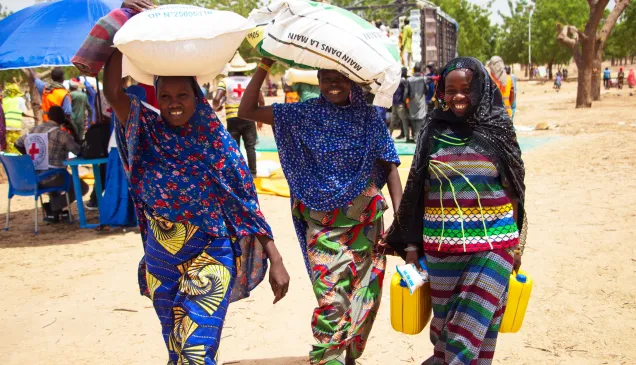Group photo of seminar attendants from the AU Member States, experts, the UN Agencies, AU partners and the ICRC.
African Union: ICRC seminar on use of Explosive Weapons in Populated Areas


Wars are being fought in cities, towns and villages. Missiles. Mortars and bombs are being used. First panel of the seminar stressed the consequence of using explosive weapons on civilians in populated areas. Mr Bruce Mokaya, Head of ICRC delegation to the African Union, H.E Ambassador Sebade Toba, Ambassador of Togo to the AU, H.E. Baye Diop, Ambassador of Senegal to the African Union and and Mr. Ahmed Mokhtar Awed, Ag. Director for the AU Peace and Security Department

“The African Union is convinced on the need to address the issue of explosive weapons in populated areas, within the Silencing of the Guns by 2020 initiative,” said Mr Ahmed Mokhtar Awed, Ag. Director for the AU Peace and Security Department.

“Africa held the first regional conference and Africans states adopted the first international instrument on the protection of civilians from the use of Explosive Weapons in Populated Areas (EWIPA), through the Maputo Communiqué of 28 November 2017. We should continue being at the forefront in the global humanitarian and diplomacy advocacy on EWIPA.”
H.E. Ambassador Sebade Toba, Ambassador of Togo to the AU

“The protection of civilians in armed conflicts must be an absolute priority both for States, and non-state armed groups. The protection of civilians, civilian objects and public infrastructure such as schools and hospitals, during war is crucial. The Republic of Senegal fully supports all initiatives aiming at sustainably ensuring protection of civilian in armed conflicts.”
H.E. Baye Diop, Ambassador of Senegal to the African Union

“Explosive weapons such as missiles, mortars and bombs are fabricated for use in open battlefield. Therefore, they have wide-area effects that are indiscriminate and cause grave harm to civilians and public infrastructure like schools and hospitals. They harm civilians directly, causing their death and injury or the destruction of civilian objects; but also indirectly causing the disruption of essential services such as education and health,” said Mr Bruce Mokaya, Head of ICRC delegation to the African Union

There is an urgent need for armed forces to reassess and adapt their choice of weapons and tactics when operating in populated areas. Some militaries are moving in this direction, but more needs to be done, and soon. The ICRC continues to engage in a bilateral and confidential manner with States and armed forces to identify “good practices” that can serve as such mitigation measures.
Emily Misola Richard, Legal Advisor, ICRC delegation to the African Union

Civilians are forced to flee from their cities, towns or villages to save their lives. They also flee because the use of explosive weapons destroys hospitals, schools and other public infrastructures they need for their well-being. AU representative explains the link between the use of explosive weapons in populated areas and displacement.
Mr Renny Mike Wafula – Representative from the Humanitarian Affairs, Refugees and Internally Displaced Persons Division, Department of Political Affairs, African Union

“In Somalia we have witnessed the grave humanitarian consequences of the use of explosive weapons in populated areas.”
Col. Abdi Abayle, Embassy of Somalia to the African Union

Adapting military policy and practice during wars in populated areas is crucial to protect civilians. Representatives from the AU Peace Support Operations Division, AMISOM, MNJTF and Nigerian Armed forces discuss practical ways to protect civilians from the use of explosive weapons in populated areas.
Major General SE Udounwa, Nigerian Armed Forces, Mr. Zinourine Alghali, AU Peace Support Operations Division (PSOD), H.E. Ambassador Sebade Toba, Ambassador of Togo to the AU Mr Kareem Adebayo, Head of the Protection, Human Rights and Gender Unit, AMISOM, Major Mannix Kevin Nyiam, MNJTF

“This past summer, in two months alone, around 100,000 people were displaced due to heavy bombing and shelling in Tripoli, Libya. Displaced persons are often exposed to harsh living conditions and to heightened risks – including of disease and sexual violence. Displacement is often prolonged after active hostilities are over.” Gilles Carbonnier, Vice-President of the ICRC at Vienna conference on "Protecting Civilians in Urban Warfare" (1-2 October 2019)
Abdulrahim Hafalish, Counsellor from Libya Embassy to the African Union attending the AU-ICRC Seminar on Explosive Weapons in Populated Areas

Missiles, mortars, bombs are explosive weapons meant to be used in open battlefield and not in cities, towns or villages. The characteristics of explosive weapons are illustrated by a representative from Geneva International Centre for Humanitarian Demining (GICHD).
Silvia Cattaneo, Geneva International Centre for Humanitarian Demining

“The impact of the use of explosive weapons on healthcare is extremely high.”
The human cost of EWIPA and its direct and indirect impact, particularly on healthcare, was explained by a representative of Handicap International.
Mr. Baptiste Chapuis, Disarmament Advocacy Officer, Handicap International
Wars are increasingly being fought in urban areas. Explosive weapons such as missiles, mortars, artillery, bombs are being used in cities, towns, villages causing immensurable damages on civilians and public infrastructures like schools and hospitals. That is why the African Union Peace and Security Department and the ICRC delegation to the African Union held their biennial seminar on IHL focusing on the use of Explosive Weapons in Populated Areas.
The seminar was attended by the AU Member States, experts, the UN Agencies, and partners. The seminar featured High-Level panellists such as the Ag. Director for the AU Peace and Security Department, Mr Ahmed Mokhtar Awed, the Ambassador of Senegal to the AU, H.E. Baye Diop; the Ambassador of Togo to the AU, H.E Ambassador Sebade Toba, and the ICRC Head of Delegation to the African Union, Mr Bruce Mokaya. Other panellists included representatives from the Nigerian army, MNJTF, Handicap International and the Geneva International Centre for Humanitarian Demining.



